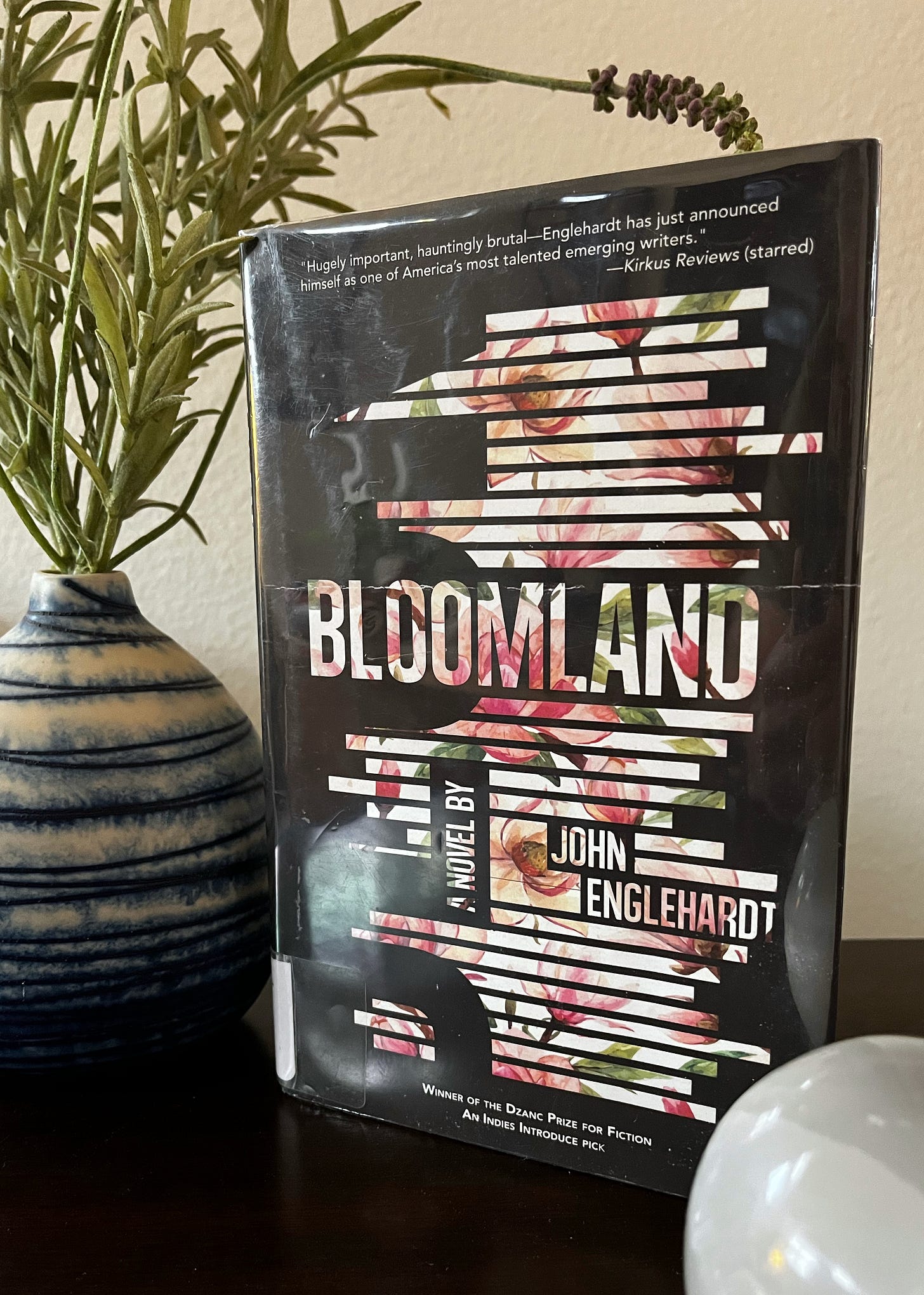What I'm Reading: "Bloomland" by John Englehardt
An important, hard-to-read novel about gun violence
What if I told you the most beautiful novel I read this year was about a mass shooting at a school?
What if I confessed that even writing that sentence, when held against the horrors of Sandy Hook, Uvalde and too many other instances of gun violence, pricks my conscience and makes me wonder how I could even write such a sentence?
What if I soothed myself by saying, “Okay, but the sentences in Bloomland by John Englehardt are, each and every one, tiny buds of flowers (as the title implies) which open their petals when your eyes pass over them until by the end you’re standing in a garden of riotous color with, yes, bright splashes of crimson”?
What if I mentioned I came to this short novel, published in 2019 by Dzanc Books, about a shooting on a fictional Southern college campus by serendipity while I was staying overnight at my friend’s house and after hearing author and book reviewer Russell Rowland mention more than three times in our conversation how great Bloomland was and, starting to get exhausted by his praise, finally picked up the copy he had lying around and while flipping through the pages saw the word “Ozarka” and exclaimed, “Oh, it’s set in Arkansas?” to which Russell replied “Yes” and my senses were immediately a-tingle because I’m currently deep-diving into Arkansas literature?
What if I said this is sometimes the most satisfying way to find great books: by surprise—like, say, while walking down a drab city street and turning a corner, you are suddenly confronted by a wall made entirely of bright-blooming flowers?
What if I told you that I just randomly opened the book and plucked these flowers, these sentences: “You have wandered into the pitch black of an ice storm. Enduring all this will feel like getting soaked by death and never drying off completely, but in time you will learn how to cope.”?
What if I said that Bloomland can be easily read in a single sitting but I extended my walk through its garden of words to a leisurely nine days?
What if I explained the story of the campus shooting is told from three different perspectives: freshman Rose who is still trying to recover from the trauma of being whirled into the sky by a tornado six years earlier when the shots ring out at the campus library; college professor Eddie whose wife was one of the shooting victims; and the shooter himself, a disillusioned and maginalized young man with the Biblical name Eli?
What if I furthered explained each of those perspectives, told chapter by chapter, is written in the second-person point of view so that Englehardt forces readers to adopt the you persona as they read, to make them both complicit and compassionate as the events unfold?
What if I said that somehow that literary experiment works perfectly?
What if I confessed there were times I hated this book for the way it made me feel so deeply that sadness and depression welled up inside me and I had to set it aside for a day? What if I said I was drawn back to it the next day and found myself identifying with Eddie’s grief even though my own wife is very much alive and breathing and how relieved and grateful that made me feel?
What if I said this book is about life as much as it is about death?
What if I said I was also drawn deeply into Eli’s whirlpool mind and found myself understanding, at least to a small degree, his motivation and so that by the time he utters his final words in the book—“Something was missing, and the shooting was my way of trying to get it back”—I found myself with an odd, uncomfortable lump in my throat?
What if I said the very, very last word of the book was “gunshot” and, rather than a cheap, deliberately-chosen punctuation mark, it rang clear and true?
What if I told you all this? Would you still want to read it?
What if I leaned in close and said, “I sure hope you do”?
Van-ishing America is a reader-supported publication. Please consider becoming a paid subscriber, if you’re inclined and able. Your support is how I’m able to continue this work. Thanks for reading!



I love this review...so clever, my friend. And if people are interested, here's the interview I did with Mr. Englehardt about this book: https://russellrowland.substack.com/p/episode-seventeen-john-englehardt
Sounds like a good novel on a vital subject I look forward to reading. Here in southwest Montana we've had our share of tragic gun violence. Years ago, at the Margeret Leary Public Elementary School in Butte, a student who'd been bullied by classmates because his folks had AIDS brought his folks' gun to school and in the schoolyard accidentally shot and killed another student who happened to be in the path of the bullet. More recently, in Anaconda, a mentally ill military vet suffering from PTSD shot and killed three patrons and a bartender in a local bar. I wrote a column for our Butte paper asking why someone who'd been diagnosed as schizophrenic and bipolar was able to legally purchase the rifle used in the shooting. The answer is that Montana has virtually no gun control laws at all. Consequently, we have the second highest suicide rate in America, and guys are usually the weapon of choice, since they provide the easiest and most effective way to kill yourself.